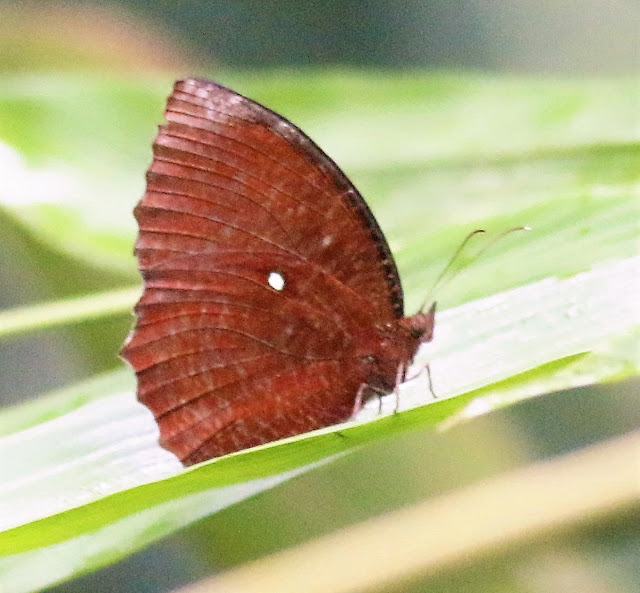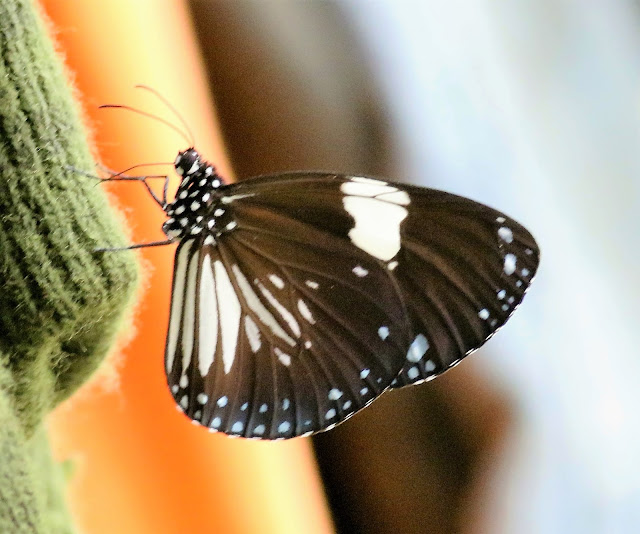 |
| Appias lalassis indroides Burmese Puffin |
Kingdom: Animalia
Phylum: Arthropoda
Class: Insecta
Order: Lepidoptera
Family: Pieridae
Subfamily: Pierinae
Tribe: Pierini
Genus: Appias
Species: Appias lalassis
Sub Species: Appias lalassis indroides
Note: i have initially identified the above butterfly as a "Great Orange Tip" but alas it is not ! Local butterfly expert Liew Nyok Lin was kind enough to correct its identification to "Appias lalassis indroides" (Burmese Puffin) instead. Apparently this pierid which is a member of the genus "albatross" is endemic to Peninsular Malaysia. I can't find many literature on this butterfly so i guess it is also an uncommon butterfly. Here is what Liew Nyok Lin has to say about this butterfly:
"This butterfly is a submontane and montane species but was found quite regularly from May onwards puddling in moist spots by the stream singly and sometimes in small numbers. It has a much more elongated forewings than Appias indra, visibly curved at the apex but the uppersides has the same plain black and white coloring. The undersides resemble that of the Great Orange Tip with brown mottling. They sometimes descend to the foothills in deeply wooded vicinities with water"
Here is another butterfly which you would not often see.
 |
| Chersonesia rahria Greater Wavy Maplet |
As compared to the 'Common Mapwing', this Maplet is certainly way much smaller than the former.
 |
| Elymnias hypermnestra Common Palmfly |
This is another uncommon butterfly with its distinctive white costal hindwing spot seen clearly here.
One of the genus "Eurema" butterflies which can make my "kepala pusing".
This is a toss between an "Anderson's Grass Yellow" (Eurema andersonii andersonii) and a "Forest Grass Yellow" (Eurema simulatrix tecmessa). However i believe this one should be an "Anderson's Grass Yellow" although i can barely see its single cell spot on the underside of its forewing. Having said that, we should also take note of the following comments from the Singapore's Butterfly Circle Group:
"However, we feel that, as E.andersonii is not the only species amongst the Eurema group to have a single cell spot, and should not lay claim to this common name as it could cause confusion. This is because the cell spots form just part of the diagnostic features of separating the Eurema group of species."
 |
| Orsotriaena medus (Dark Grass-Brown) |
For reasons of identification, this butterfly (above) should be more straight forward.
 |
| Euploea radamanthus (Magpie Crow) |
If you can't get minerals from the soil then you can also get it from some socks.
Here it is again (Magpie Crow) flapping away with its wings on a down ward motion.
 |
| Common Bluebottle |
 |
| Zemeros flegyas |
What a surprise ! A "Punchinello" seen here in a lowland forest.
 |
| Correction: Mycalesis perseoides (Burmese Bush-Brown) |
Here it is again showing off all its veins.
 |
| Neorina lowii (Malayan Owl) |
This butterfly had always posed the facedown way to me!
A rusty looking Archduke (Lexias pardalis)
 |
| Moduza procris |
The "Commander" is seen here with its long proboscis, soaking up whatever remaining minerals available in an abandoned cloth.
It is always nice to conclude with a "Painted Jezebel" (Delias hyparete). The flowers here look like they came from the "mile-a-minute" weed.










2 comments:
Dear Ronnie,
The first pierid is not a Hebomoia but rather an Appias lalassis, a forest butterfly. They differ quite a lot morphologically
Thanks for the correction. I wonder whether it has any common name?
Post a Comment